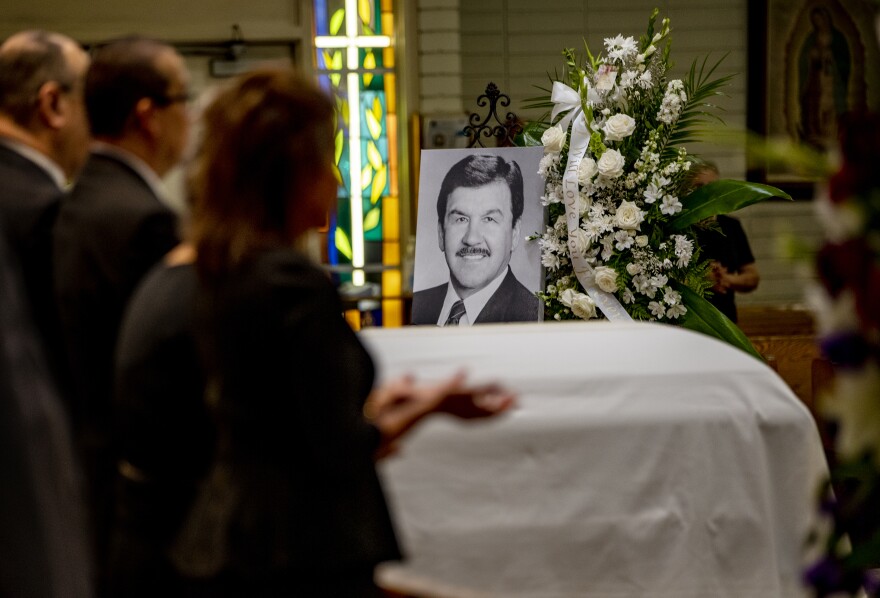Updated October 17, 2022 at 5:25 AM ET
As a first-generation college student, Gustavo Arellano remembers the time he was cobbling together as much money as he could to pay for tuition fees.
"It might have been a counselor who told me, 'You should apply to the Hispanic Scholarship Fund. They don't give out much money, but they give money.' So, I applied," Arellano said.
He's not sure how much he received — either $500 or $1,000 — but the one thing he does remember was the letter that came with the check. In it the founder of the scholarship fund, Ernest Robles, wrote that it was just the beginning of Arellano's career.
Robles was right. Arellano has had a successful career as a journalist and is now a columnist at the Los Angeles Times. And he's one of the scholarship recipients who's noting how much of a difference the Hispanic Scholarship Fund — and Ernest Robles — made on his life.
Robles died of heart failure at the age of 92 on Sept. 5.
Robles' journey toward a life in the education field started at Riverside Community College in Southern California. He utilized the benefits given to him after serving as a U.S. Marine in the Korean War — where he was awarded a Purple Heart, Bronze Star and a Navy Commendation Medal of valor.
Robles played football at RCC before ultimately leaving for the University of California, Los Angeles to obtain a degree in U.S. history. He received a master's degree in education from the University of Redlands.
Robles went on to work in his hometown, Riverside, as a teacher and principal. At one point, he worked for the U.S. Office of Education, serving court orders to school districts in the South to desegregate.
In 1975, Robles and his wife, Dora, used a $30,000 second mortgage on their home to found the Hispanic Scholarship Fund.
"I wanted to develop a coalition that would bring together diverse Hispanics to work on a clearly defined focus," Robles told The Hispanic Outlook in Higher Education in 1996.
Robles said his biggest aim for scholarships was for Hispanic students already in college to finish college — more than a third of Hispanics who enrolled in college would later drop out, according to a 1989 Associated Press report.
For the first eight years, Ernest and Dora Robles ran the Hispanic Scholarship Fund from their home. But over the years the operation grew, securing funding from major corporations. As of today, the fund has granted over $700 million in scholarships to tens of thousands of students.
Recipients say the organization helped create new opportunities for them
Sebastian Flores and Dalia Vasquez are current HSF Scholars. Both of them felt the stress of high tuition costs and other fees.
"My parents' income was very close to the United States' poverty line," said Flores. "And so being able to apply for this scholarship and ultimately receiving it, it allowed me to pursue an education that my parents weren't able to receive."

He's currently studying computer science at Villanova University.
Dalia Vasquez remembers the day she got the email notification that she was a recipient. As a first-generation college student and the oldest of seven, her family's finances were tight.
She was working two fast food jobs while also enrolled as a full-time student at The University of Texas at Austin. But money from the scholarship allowed her to focus more on her education: She's studying human geography and is also researching how Latino populations are affected by climate change.

Flores and Vasquez say HSF also opened the door to making connections in spaces Latinos are not commonly in.
"They definitely are working towards building and growing those skills with students one on one," explained Vasquez. "They have career services and they really do try to hone in those skills of like how to communicate in those spaces and how to navigate in those settings."
HSF currently holds several career events including summits dedicated to learning more about professions in media, health care and finance.
"The more exposure that this gets and the more this reaches those Latinos, that's what I hope is what happens, is those Latinos can find this and then be able to get a higher education, which would ultimately allow them to move their family up," stressed Flores.
Flores says having his own network gives him the inspiration and motivation to keep going on — despite all the barriers that might arise.
Both Flores and Vasquez did not really know Robles' story, but they are now appreciative of all that he did for Latino students.
In a recent column, the LA Times' Arellano wanted to highlight the work of Robles — so that he and others could celebrate an instrumental figure in their lives.
"Hopefully in the future we do want to value our heroes more and we do want to value these unsung community heroes," Arellano told NPR's All Things Considered. "Heroes who did so much without the spotlight. Well, let's give them the spotlight while they're alive."
Copyright 2023 NPR. To see more, visit https://www.npr.org.

